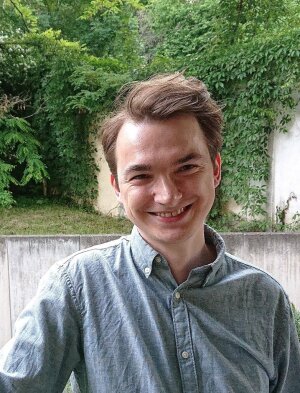Maximilian Höhn, M.A.
Contact
Maximilian Hoehn
Image: Nadine HöhnE-Mail: maximilian.hoehn@uni-jena.de
-
Vita
28. December 1994
born in Eisenach
Juni 2013
Abitur am Elisabeth-Gymnasium Eisenach
2013-2017
Bachelors programme in Classical Studies and History at the Friedrich-Schiller-University Jena
2016-2019
Tutor at the Chair of Ancient History at Friedrich-Schiller-University Jena
2017-2020
Masters porgramme in Ancient History at the Friedrich-Schiller-University Jena
since April 2020
Doctorate at the Friedrich Schiller University Jena
seit August 2021
Funding of the dissertation by the German Academic Scholarship Foundation
WiSe 2021/22
Lecturer at the Chair of Ancient History at Friedrich-Schiller-University Jena
2022-2023
Parental leave replacement as research assistant at the Chair of Ancient History Friedrich-Schiller-University Jena
-
Publications
Reviews
- ReviewExternal linkof Bleeker, Ronald A., Aspar and the Struggle of the Eastern Roman Empire. AD 421-71, London u. a. 2022, in: Plekos 25, 2023, 127-132. (German)
- ReviewExternal link of Bendle, Christopher, The Office of Magister Militum in the 4th Century CE. A Study into the Impact of Political and Military Leadership on the Later Roman Empire, Stuttgart 2024, in: H-Soz-Kult 23.09.2024. (German)
Conference reports
- Conference reportExternal link: Ausdrucksformen des Imperiums. Indirekte Herrschaft im Sāsānidischen Commonwealth, 07.09.2023 - 09.09.2023, Jena, H-Soz-Kult, 22.10.2023.
-
Presentations
- Zwischen Machtfaktor und Belastungsprobe. Die oströmischen Heermeister von Arcadius bis Anastasius I., 11.07.2022, Universität Düsseldorf, Forum Antike & Mittelalter
- Influence and Power in the 5th Century - The Entanglements of the Eastern Roman Master of Soldiers Aspar, 06.07.2023, University of Leeds, International Medieval Congress; Session 1542: Standing between Worlds
- The Crises of Zeno's Rule and the Role of the magistri militum (474–491), 04.07.2024, University of Leeds, International Medieval Congress; Session 1514: Structures against Crises?, Teil 1
- Kaisertum in der Krise? Leo I. und Zeno im Konflikt mit ihren Heermeistern, 14.11.2024, Universität Graz, 18. Jungakademiker:innen-Tagung
- Aspar, Basiliscus und Armatus. Oströmische Heermeister als Belastung für das Kaisertum, 30.11.2024, Universität Jena, Mittdeldeutsches Althistorikertreffen 2024
- Die magistri militum unter Kaiser Arcadius - 'Antimilitärische' Tendenzen?, 15.05.2025, 3. Jungmitgliedertreffen der Mommsen-Gesellschaft
Projects
-
Between power factor and test of endurance. The Eastern Roman Master of Soldiers from Arcadius to Anastasius I.
While in the 5th century in the Western Roman Empire powerful Master of Soldiers such as Stilicho, Constantius, Aëtius and Rikimer decisively determined the affairs, such a development is not discernible in the Eastern Roman part of the Empire. By establishing efficient structural and institutional mechanisms, the Eastern Roman emperors and other civil authorities succeeded in controlling their military and limiting its influence outside the purview of the military leadership. Only a few army masters, such as Aspar, managed to overcome this system for a short time.
The dissertation will address this phenomenon, explaining the special character of the Eastern Roman Master of Soldiers from the internal structural factors of the eastern part of the empire. In doing so, the thesis will elaborate a comprehensive picture of the office in general and specifically examine the scope of action of the eastern Master of Soldiers. Taking into account theoretical approaches of political science on the relationship of the civil to the military sphere, it will also get to the bottom of the circumstances and methods of the Eastern Roman Empire that prevented 'overbearing' generals.
Based on a systematic analysis of the political and military actions of all magistri militum in the Eastern Empire from Arcadius to Anastasius I, the role of these officials in the power structure of the Eastern Roman Empire will be analyzed comprehensively for the first time. Furthermore, a deeper insight into the organization and functioning of the Eastern Roman Empire will be gained by examining the structural and institutional control mechanisms.
